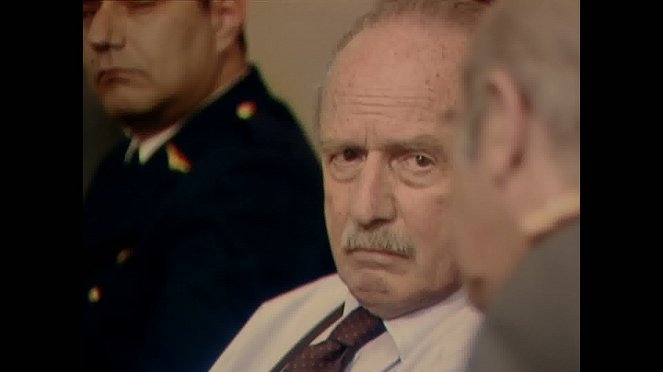Directed by:
Pablo LarraínCinematography:
Sergio ArmstrongComposer:
Carlos CabezasCast:
Gael García Bernal, Alfredo Castro, Néstor Cantillana, Antonia Zegers, Jaime Vadell, Pablo Krögh, Amparo Noguera, Pedro Peirano, Sergio Hernández (more)VOD (1)
Plots(1)
Starring Gael Garcia Bernal, this is the inspiring true story of the advertising executives who fought a dictator with an advertising campaign. Chile, 1988. International pressure forces dictator General Pinochet to call for a referendum on his presidency. Brash young advertising executive Rene Saavedra (Bernal) spearheads the opposition campaign, but after years of 'disappearances' and threats to himself and his colleagues, can they really win the election using happiness? No is the concluding part of highly acclaimed director Pablo Larrain's Pinochet trilogy following on from Tony Manero and Post Mortem. (Network)
(more)Reviews (4)
I’d been looking forward to an historically accurate drama portraying Chile under the leadership of then dictator Pinochet. But I hadn’t expected that this movie would be so accurate that it would also use image to try to transport me to the 1980’s. And truth be told, the historical accuracy was pretty strong. What was worse was the picture, which reminded me of the picture quality in the worst C-list movies from the 1980’s recorded on worn-out VHS tapes, I guess it was supposed to invoke the proper historic atmosphere. So, I can hardly say that the movie wasn’t original, but I do have to admit that I didn’t manage to get used to this manner of storytelling. The skipping of individual scenes and intentional cuts like in the times of the commies might look interesting, but in connection with the accurate historic description of even the slightest fart of an ordinary cleaning lady at the “No” movement, it comes across as rather boring at times.
()
Democracy as a sexy product and Pinochet destroyed, among other things, by free-market marketing rivalry? Despite the detachment of the introduction, for me this film represents an ideal synthesis of retro consistency of Good Night, and Good Luck (whilst noting that thanks to the masterfully meaningful television look, it goes a bit further) and the fun of Frost / Nixon (those collages of spots are fantastic). In addition, thanks to the great Bernal, the intimate plane also works. No is a drama / para-documentary that seamlessly combines records of history and fiction, but it does not do so to convince us that it captures the pure truth of history, but rather to show how our civic experience of truth is always necessarily mediated, truncated and distorted. In the end, luck and people with baguettes in a basket always work best. Good evening.
()
Before the start of the movie, flashy previews of blockbusters with enticing visuals and glossy advertisements appeared on the movie theater screen, which attempted to grab the viewers' attention with short-term effects. Then followed a grainy, blurred image that seemed to come from a TV screen from the 80s or a vintage documentary, and especially in contrast to the previous shots, it appeared as a shabby relative. I still vividly remember the events related to the referendum on Pinochet's stay in office. Practically nobody wanted to believe that with all the power he possessed, he would voluntarily relinquish the government and his convincing victory in the manipulated electoral process was expected. Well, it shows the way the general, who seemingly held all the aces, managed to return from the presidential office back to the barracks. I'm not talking about the undeniable crimes and certainly not the revolutions and protests but about the humor and advertising. Instead of dissidents, Pinochet was escorted by advertising strategists and creative minds. They won the duel against their government competitors because they bet not on fear but on hope. The best ideals, programs, or personalities are not sellable and enforceable without proper advertising. The charismatic Bernal is sidelined here, and the film focuses on processes and events, not on the main character, who is rather a kind of guide and connector. It's a small but interesting film that will be remembered. Overall impression: 90%.
()
A glimpse into the final days of a dying right-wing dictatorship that, in the changed global geopolitical situation, was unable to legitimize its worn-out and directionless system both internally and externally. Nevertheless, its foundations were unfortunately stronger than they might have initially appeared. Peace and order, work, three meals a day, and even the possibility for some to pay for their children's education - people suddenly begin to tolerate disappearances, murders, torture, and so on. What is sad about Chile in this case is not only this aspect but also the way in which it was defeated (at least according to this film, which unfortunately is not far from the truth). Democracy is actually amorphous, everything and nothing, functioning only on the basis of primitive emotional patterns that can easily be manipulated by people. And when democracy triumphs? Then it's time for the exchange again - trading material well-being for tolerance of inequalities, poverty, wasted prospects and potentials for those at the bottom, and so on. Therefore, the ending is chilling even for the inhabitants of the "free world" - democracy is actually a product created by a (political) advertising agency...
()

